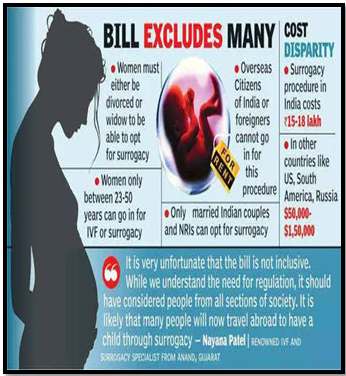HIGH COURT RULING ON SURROGACY CONSENT
Why in the News?
- Contradictory Condition: The High Court of Karnataka declares that making surrogacy using donor gametes a condition in the consent form contradicts the Surrogacy (Regulation) Act, 2021.
Source : Times of India
Legal Observation:
The court emphasizes that allowing such conditions in the consent form would defy the Surrogacy Act and Rules, stating it would be like letting “the tail wag the dog.”
| Surrogacy Laws in India
· Legislation: India regulates surrogacy through the Surrogacy (Regulation) Act, 2021, which replaced outdated regulations. · Eligibility Criteria: The law outlines criteria for intending couples, emphasizing Indian citizenship, heterosexual marriage, and proven infertility. · Altruistic Surrogacy: The Act allows altruistic surrogacy, where a woman willingly carries a child for a couple without any monetary compensation beyond medical expenses. · Commercial Surrogacy Ban: Commercial surrogacy, involving payment to the surrogate, is prohibited to prevent exploitation and ensure the well-being of surrogates. · No Same-Sex Couples: The Act restricts surrogacy to heterosexual couples, excluding single individuals, unmarried couples, and same-sex couples. · Age Limit: The law establishes age limits for both intending parents and surrogates, aiming to safeguard the health and interests of all parties involved. o Male :26-55 years o Femal : 23 to 50 years. · Parental Rights: The Act grants parental rights to the intending couple from the beginning, avoiding legal complications after the child’s birth. |
Permission Granted for 12 Couples
- Judicial Approval: Despite the controversial clause in the consent form, the High Court grants permission to 12 couples to proceed with surrogacy using donor female gametes.
- Rights of Eligible Couples: The court criticizes the consent form for depriving eligible couples of the right to undergo gestational surrogacy using donor gametes, a practice permitted by the Act and Surrogacy Rules.
The matter is still pending before the Higher Court.

 Source : Times of India
Source : Times of India

